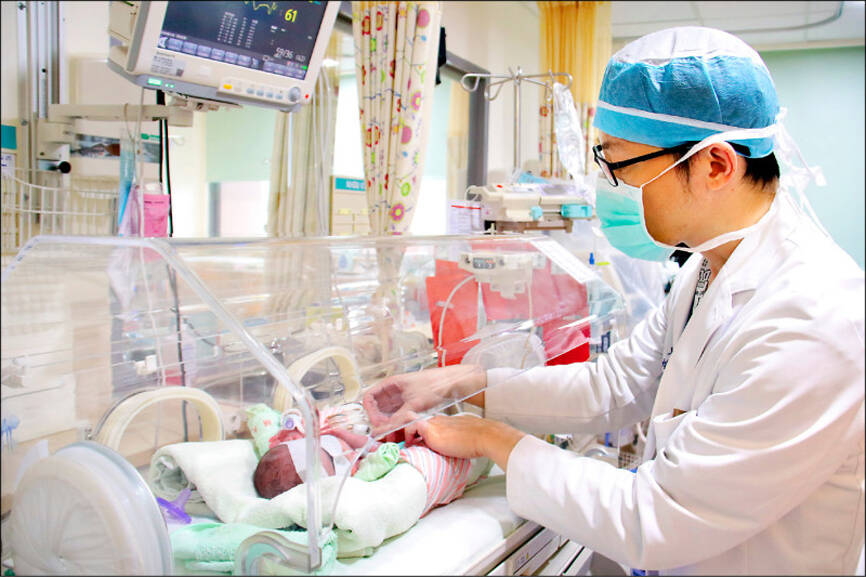Taiwan could face a pediatric surgeon shortage within the next decade, as the nation currently only has 73 practicing specialists, data from the Taiwanese Association of Pediatric Surgeons showed.
While some newborns might face their first moments of life in an operating room if they are born with conditions such as an imperforate anus, intestinal atresia or congenital urinary anomalies, a healthy future is possible — provided the conditions are quickly diagnosed and treated by a professional pediatric surgeon.
However, the number of pediatric surgeons in Taiwan has declined to 73 nationwide, most of whom were 40 to 60 years old, while those aged 30 to 40 made up only 13.9 percent, indicating an impending workforce shortfall within 10 years, the data showed.

Photo: Taipei Times
Association secretary-general Hsieh Ming-yu (謝明諭) on Saturday said that in Taiwan, educating pediatric surgeons is a long process.
A medical student, after graduating college, must undergo two years of post-graduate training, four years of general surgery training and four years of special training in pediatric surgery.
That means at least eight years of training, with another three years of clinical experience usually required for them to become fully competent, he said.
Association chairwoman Chen Yun (陳芸) said that many pediatric surgeons chose to leave the profession despite completing the lengthy training process, largely due to limited caseload caused by declining birthrates, tight work shifts and underallocated National Health Insurance (NHI) points.
For example, imperforate anus surgery is reimbursed at only NT$60,000 (US$1,819) under the NHI system, whereas the same procedure could cost up to NT$6 million in the US, she said.
The pediatric surgeon training system itself is also facing challenges, too, Chen said.
Training hospitals risk disqualification if they fail to meet the minimum number of benchmark surgeries required, she said.
However, the number of pediatric surgeon training hospitals has declined from 18 to 16 due to decreased caseload, with the National Taiwan University Hospital’s Hsinchu Branch and the Tri-Service General Hospital in Taipei being removed from the list, Chen said, adding that Kaohsiung E-Da Hospital is also facing removal.
A pediatric surgeon at a medical center speaking on condition of anonymity said that regulations fail to stipulate whether surgical operations for people aged 18 or younger must be performed by pediatric surgeons, so such operations are often taken over by surgeons from other departments, leading to fewer opportunities and lower income for pediatric surgeons.
When combined with factors such as high work pressure, staff shortages and demanding work schedules, it is increasingly difficult to attract the next generation of pediatric surgeons.
The government should not only boost funding by raising the NHI reimbursement rates for benchmark pediatric surgeries, but also provide incentives such as additional bonuses for operations performed on patients younger than 18, Chen said.
Increasing NHI payments for pediatric surgery would have a minimal financial impact on the NHI system, as the profession’s reimbursements account for just 0.38 percent of the NHI’s global budget, Hsieh said, adding that the adjustment can significantly improve the future of pediatric surgery.

Taipei has once again made it to the top 100 in Oxford Economics’ Global Cities Index 2025 report, moving up five places from last year to 60. The annual index, which was published last month, evaluated 1,000 of the most populated metropolises based on five indices — economics, human capital, quality of life, environment and governance. New York maintained its top spot this year, placing first in the economics index thanks to the strength of its vibrant financial industry and economic stability. Taipei ranked 263rd in economics, 44th in human capital, 15th in quality of life, 284th for environment and 75th in governance,

Greenpeace yesterday said that it is to appeal a decision last month by the Taipei High Administrative Court to dismiss its 2021 lawsuit against the Ministry of Economic Affairs over “loose” regulations governing major corporate electricity consumers. The climate-related lawsuit — the first of its kind in Taiwan — sought to require the government to enforce higher green energy thresholds on major corporations to reduce emissions in light of climate change and an uptick in extreme weather. The suit, filed by Greenpeace East Asia, the Environmental Jurists Association and four individual plaintiffs, was dismissed on May 8 following four years of litigation. The

A former officer in China’s People’s Liberation Army (PLA) who witnessed the aftermath of the 1989 Tiananmen Square massacre has warned that Taiwan could face a similar fate if China attempts to unify the country by force. Li Xiaoming (李曉明), who was deployed to Beijing as a junior officer during the crackdown, said Taiwanese people should study the massacre carefully, because it offers a glimpse of what Beijing is willing to do to suppress dissent. “What happened in Tiananmen Square could happen in Taiwan too,” Li told CNA in a May 22 interview, ahead of the massacre’s 36th anniversary. “If Taiwanese students or

The New Taipei City Government would assist relatives of those killed or injured in last month’s car-ramming incident in Sansia District (三峽) to secure compensation, Mayor Hou You-yi (侯友宜) said yesterday, two days after the driver died in a hospital. “The city government will do its best to help the relatives of the car crash incident seek compensation,” Hou said. The mayor also said that the city’s Legal Affairs, Education and Social Welfare departments have established a joint mechanism to “provide coordinated assistance” to victims and their families. Three people were killed and 12 injured when a car plowed into schoolchildren and their